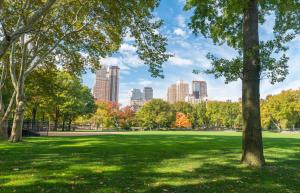During the past two weeks, over 10,000 delegates have attended the second part of the Conference of Parties (COP-15) of the UN Convention on Biological Diversity (CBD) in Montreal, Canada, as they seek to agree on the post-2020 Global Biodiversity Framework. Unsurprisingly, forests are at the centre of many of these discussions as a critical resource and habitat for life on earth. They play a fundamental role in maintaining the ecological balance at planetary and local scale, and are a source of livelihoods, medicines and food for billions of people. They also provide billions of dollars in ecosystem services each year, from water catchment and flood protection to carbon capture and climate regulation.
Often overlooked, urban forests are an equally critical habitat for biodiversity, human health and well-being, climate action and our economies. In this context, UNECE is highlighting the importance of urban forestry at COP-15, noting that forests must be a part of the action plan for halting and reversing biodiversity loss. Urban forests and trees allow cities to welcome wildlife back into our neighbourhoods, providing a habitat for migratory species and pollinators. They also often have higher tree diversity than rural forests, and thus serve as repositories of genetic diversity.
Infographic “Urban trees are key to global biodiversity”
The benefits of urban forests go well beyond protecting biodiversity. From cooling our cities to stabilizing our soil, urban trees are key allies in our fight against climate change. For example, a single tree can intercept more than 15 thousand litres of water a year. At the scale of an urban forest, this can capture water for entire local ecosystems.
To mark the importance of urban forests and ensure concrete coordinated commitment from cities to integrate trees and green spaces in their cityscapes to deliver their many benefits for biodiversity, climate change mitigation and sustainable development, UNECE joined ICLEI’s CitiesWithNature platform. This platform provides a shared platform for cities and their partners to engage and connect, working with shared commitment towards a more sustainable urban world.
Through its Trees in Cities Challenge (TiCC), UNECE has encouraged mayors from all over the world to implement tree-planting pledges. Nearly 70 cities around the world have already vowed to plant and maintain 13 million trees, committing themselves to urban forestry as an integrative nature-based solution for sustainable development. Joining ICLEI’s CitiesWithNature platform will help reinforce this initiative and widen it across all continents.
As two thirds of humanity are expected to live in cities by 2050, now is the time for cities and countries around the world to join this commitment to sustainably managing urban forests as we seek to deliver the post-2020 Global Biodiversity Framework, the Paris Agreement, and the United Nations Sustainable Development Goals (SDGs).
Note to editors
Find more information about the Joint UNECE/FAO Forestry and Timber Section urban forestry initiatives:
Learn more about the topic:
Read more about ICLEI’s CitiesWithNature:


